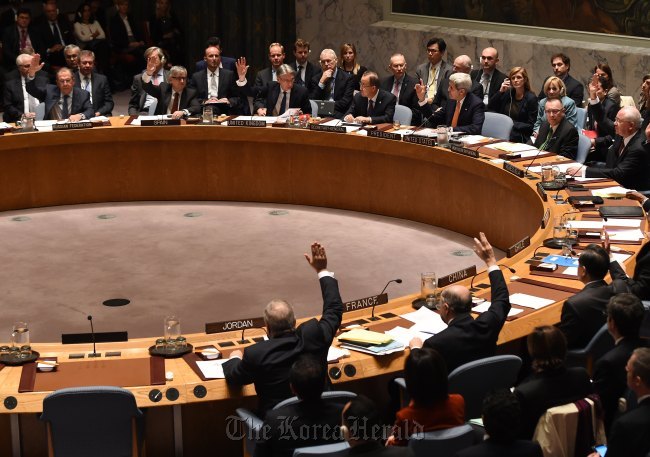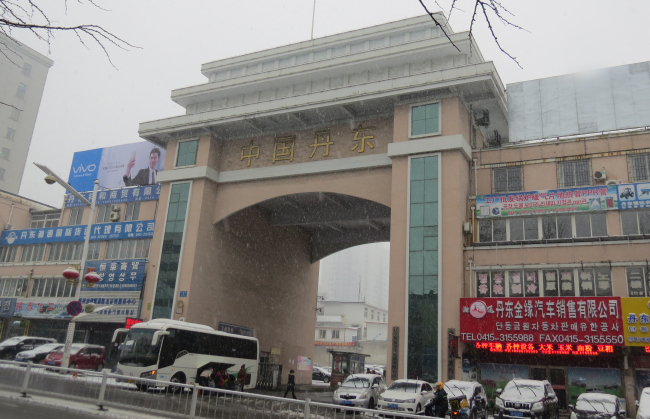The UN Security Council on Wednesday approved a fresh batch of sanctions following North Korea’s fifth nuclear test, seeking primarily to slash the state’s coal exports to China by nearly 60 percent and prohibit trade of copper, nickel and other minerals.
Resolution 2321 is designed to further stifle Pyongyang’s financial and maritime networks, diplomatic activities and overseas labor exports, while levying a new embargo on sales of statues, helicopters, ships and other items. It also called for tighter inspections on North Korean cargo and expanded the list of entities and individuals subject to an asset freeze and travel ban.
The North’s underground detonation in September defied a previous resolution the council imposed only six months before in response to the North’s fourth nuclear test and another long-range missile test-fire.
 |
The UN Security Council. (AFP-Yonhap) |
Seoul and Washington kicked off negotiations with the goal of “plugging loopholes” in the existing sanctions, such as a clause allowing coal trade for “livelihood purposes,” which they argue Pyongyang had been taking advantage of.
However, negotiations with the other four veto powers had dragged out, chiefly due to the resistance of China, the North’s top trade partner and diplomatic backer. The latest resolution took 82 days -- the longest-ever -- until its introduction.
Seoul welcomed the results, saying that the measures, if successful, could cut the cash-strapped Kim Jong-un regime’s hard currency earnings by at least $800 million.
“The latest resolution marks another milestone in imposing the most robust and comprehensive nonmilitary sanctions in UN history on North Korea for its habitual violations of the UN charter and UNSC resolutions,” Foreign Minister Yun Byung-se said at a news conference.
“The North must bear in mind the council’s warnings. It might face not only deepened economic trouble and diplomatic isolation, but also a suspension of its rights and privileges as a UN member state, unless it makes a strategic decision to take the path toward denuclearization.”
Natural resources are the top source of foreign currency for North Korea. Statistics from Beijing’s National Bureau of Statistics of China show that in 2015 the country sold 19.6 million tons of coal to China, amounting to more than $1 billion.
Starting from Jan. 1, however, the North’s annual coal exports will be capped at $400.9 million or 7.5 million metric tons, whichever is lower.
The resolution also restricted this year’s coal exports to $53.5 million or 1 million metric tons, whichever is lower.
In October, the coal revenue reached $102 million, up about 22 percent from a month before and nearly 70 percent higher than a year ago, Voice of America reported Wednesday, citing Seoul’s Korea International Trade Association that compiled official Chinese data.
During the monthlong period, coal took the largest share of North Korea’s total exports to China, at almost 45 percent, followed by clothes and seafood.
The council also slapped a fresh ban on sales of four minerals -- copper, nickel, silver and zinc -- extending the existing roster that includes iron, iron ore, vanadium and gold. The four metals generate around $100 million in revenue every year, the Seoul diplomat said.
The copper embargo is expected to deal a blow not only to Pyongyang, but also some Chinese mining companies. An affiliate with China’s Wanxiang Group has reportedly invested more than 28 billion won ($23.8 million) in developing copper mines in the North Korean border town of Hyesan since it acquired exclusive mineral rights through a joint venture in 2007.
“There have been fierce back-to-back negotiations. It was indeed important to adopt a resolution as soon as possible, and compromise could have been reached earlier, but we opted instead to pursue a more complete set of measures, although it took more time,” a senior official at South Korea’s Foreign Ministry told reporters on customary condition of anonymity.
“Beijing’s agreement to the sanctions seems to reflect its thinking that it needs to take action given (the North’s) behavior -- it conducted two nuclear tests and more missile liftoffs within one year -- which runs counter to China’s self-perception or pursuit as a world power.”
 |
A customs office in Dandong, China, near its border with North Korea. (Yonhap) |
In another new step, the resolution will bar the North’s sales of helicopters, ships and statues. The communist regime runs offices in charge of building sculptures, namely in Senegal, Angola, Namibia and other African nations, with one major contract being worth up to tens of millions of dollars, the official noted.
On finance, the text instructed UN member states to shut down all remaining relevant offices and bank accounts in the North within 90 days, except for humanitarian relief or other inevitable purposes. They can no longer provide any public or private export credits, guarantees or trade insurances.
It also calls for all members to reduce the workforce at the North’s overseas diplomatic missions and limit the number of bank accounts to one per mission and diplomat each in an apparent bid to prevent diplomats’ illicit activities abroad.
Inspections will toughen on sea, air and land cargo, as well as personal baggage, coming in and out of the country.
Though not mandatory, the resolution called member states’ attention to the regime’s dispatch of overseas workers, which it said is aimed at obtaining hard currency to bankroll its nuclear and missile programs.
As for the asset freeze and travel ban, the council additionally blacklisted 10 entities and 11 individuals, including former North Korean ambassadors to Myanmar and Egypt, over their suspected involvement in the country’s nuclear and missile programs.
The council also added the following to its list of luxury goods banned from transactions: rugs and tapestries worth more than $500 and porcelain and bone china tableware valued at more than $100.
By Shin Hyon-hee (
heeshin@heraldcorp.com)






![[Exclusive] Hyundai Mobis eyes closer ties with BYD](http://res.heraldm.com/phpwas/restmb_idxmake.php?idx=644&simg=/content/image/2024/11/25/20241125050044_0.jpg)
![[Herald Review] 'Gangnam B-Side' combines social realism with masterful suspense, performance](http://res.heraldm.com/phpwas/restmb_idxmake.php?idx=644&simg=/content/image/2024/11/25/20241125050072_0.jpg)

